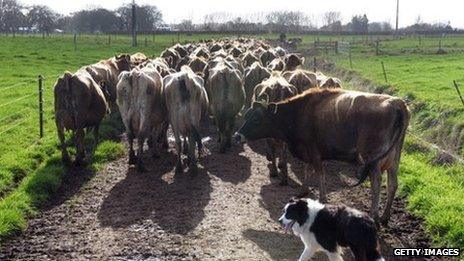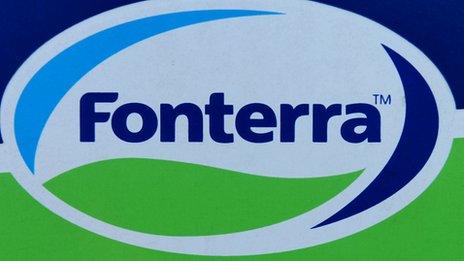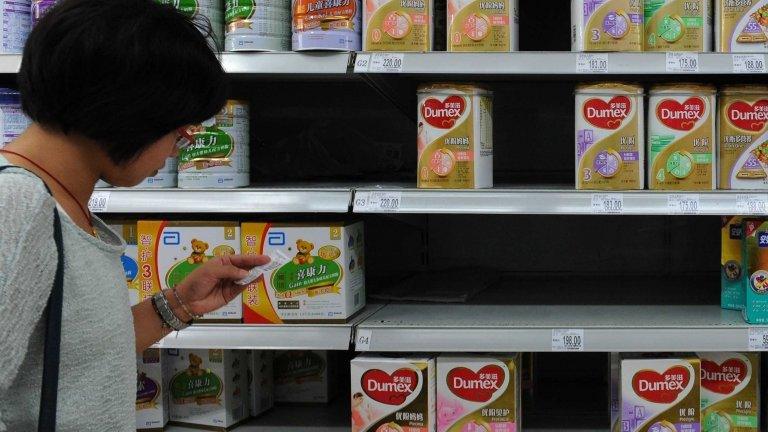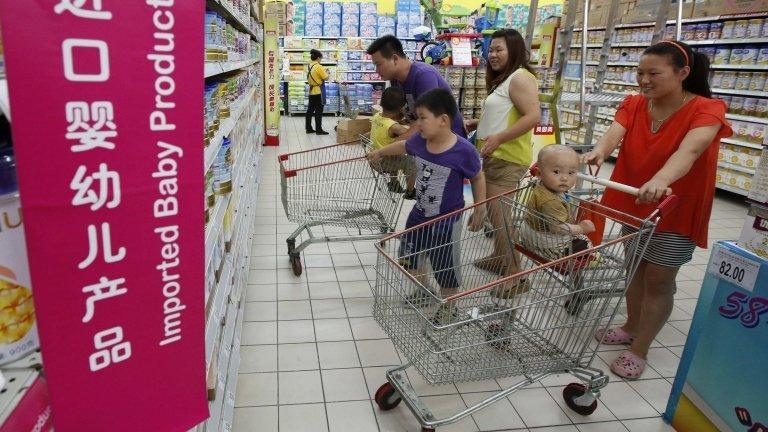Fonterra announces tie-up with big China dairy firm
- Published

About 80% of the dairy products China imports come from New Zealand
New Zealand dairy giant Fonterra has announced its intention to take a 20% stake in one of China's biggest milk processors, Beingmate.
The tie-up would help create a global supply chain aimed at China's market using Fonterra's milk manufacturing partners in Australia and Europe.
It would also help Fonterra increase its share of China's large and lucrative infant dairy food market.
China relies on New Zealand for almost all its imports of milk powder.
If successful, the new partnership between Beingmate and Fonterra would see the Chinese firm set up a joint venture to buy a Fonterra plant in Australia.
'Game changer'
It would also see Beingmate distribute Fonterra's popular Anmum brand on the mainland.
Fonterra, the world's largest exporter of dairy products, already sells its formula milk powder in China. But the BBC's John Sudworth in Shanghai says the firm believes teaming up with Beingmate will give it a much better distribution network,
Fonterra's chief executive Theo Spierings said, external the partnership would be a "game changer" and that it would provide the New Zealand firm with "a direct line into the infant formula market in China".
He also said Fonterra would work with Beingmate "to evaluate mutual investments in dairy farms in China".
"The partnership will create a fully integrated global supply chain from the farm gate direct to China's consumers, using Fonterra's milk pools and manufacturing sites in New Zealand, Australia, and Europe," the firm said.

Analysis: John Sudworth, BBC Shanghai
You might think that Fonterra would think twice before linking up with another Chinese baby formula manufacturer.
In 2008, it was a minority shareholder in one of the local dairy companies embroiled in the tainted milk scandal that saw six children killed and 300,000 others made ill by an industrial chemical added to the powder.
Fonterra was credited with helping to raise the alarm, by informing the New Zealand government, but the incident still casts a shadow over the industry in China with many parents continuing to pay substantially higher prices to buy imported milk powder.
Fonterra, though, now clearly believes that food safety standards are improving and with it consumer confidence, and that there is little choice but to find a strong local partner if they want part of the rapidly growing market.
Beingmate will give Fonterra a distribution network it could never build alone and, the New Zealand company says, growing household incomes, coupled with a recent relaxation of the one child policy, means demand for baby formula will double over the next five years.

Fonterra said the infant formula market in China was worth about $15.05bn (£9.09bn) today and that it would be worth some $27.5bn by 2017.
"This growth is driven by increasing urbanisation, higher disposable incomes, a preference for premium brands and relaxation of the one-child policy," said Mr Spierings.
China puts a premium on imported dairy food products after a tainted milk formula scandal in 2008 killed six babies and made some 300,000 infants ill.
Fonterra had a minority stake in Sanlu, one of the Chinese milk producers involved in the scandal, and called for a public recall after melamine was found to have been added to some products.

Milk formula products were returned to supermarkets across China after the Fonterra food scare in 2013
Following that, a food scare related to Fonterra products last year saw China ban all milk powder imports from New Zealand for a period of time.
Fonterra, which is a farmer-owned co-operative and the largest exporter of dairy products in the world, said it had found a bacterial strain in some of its products that can cause botulism.
Testing later found there had been no problem with the company's dairy products.
Fonterra was nevertheless fined $256,675 over the food scare, which led to a global product recall.
Mr Spierings said the firm was now moving on.
"China is a completely different environment now, Beingmate is a completely different partner... and we are also completely different from where we were five, six years ago," he told reporters.
- Published4 April 2014

- Published5 August 2013

- Published4 August 2013
